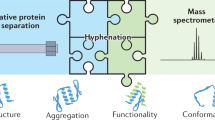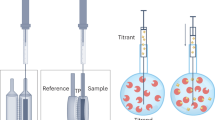Abstract
A NOVEL technique for analytical and preparative separations of compounds which can form complexes or adducts with metal ions has been worked out in this laboratory. The new technique can appropriately be called ‘ligand exchange’. The method combines two fields of chemistry, namely, ion exchange and co-ordination chemistry, in order to accomplish a task that neither could do alone.
This is a preview of subscription content, access via your institution
Access options
Subscribe to this journal
Receive 51 print issues and online access
$199.00 per year
only $3.90 per issue
Buy this article
- Purchase on Springer Link
- Instant access to full article PDF
Prices may be subject to local taxes which are calculated during checkout
Similar content being viewed by others
References
Stokes, R. H., and Walton, H. F., J. Amer. Chem. Soc., 76, 3327 (1954).
Thomas, C. L., U. S. Patent, 2,865,970 (1958). Giessen, J., and Mueller, F., U.S. Patent, 2,916,525 (1959).
Author information
Authors and Affiliations
Rights and permissions
About this article
Cite this article
HELFFERICH, F. ‘Ligand Exchange’ : a Novel Separation Technique. Nature 189, 1001–1002 (1961). https://doi.org/10.1038/1891001a0
Issue Date:
DOI: https://doi.org/10.1038/1891001a0
This article is cited by
-
Green synthesis, characterisation and antibacterial activity studies of new multifunctional nano polymeric material, which may have multidimensional application in water purification
Polymer Bulletin (2023)
-
Application of chiral materials in electrochemical sensors
Microchimica Acta (2020)
-
Conventional as well as Emerging Arsenic Removal Technologies—a Critical Review
Water, Air, & Soil Pollution (2017)
-
Ligand-Exchanging Separation of Proteins Is a Novel Method in Protein Chemistry
Doklady Biochemistry and Biophysics (2005)
-
Protein selectivity in immobilized metal affinity chromatography based on the surface accessibility of aspartic and glutamic acid residues
Journal of Protein Chemistry (1995)
Comments
By submitting a comment you agree to abide by our Terms and Community Guidelines. If you find something abusive or that does not comply with our terms or guidelines please flag it as inappropriate.



